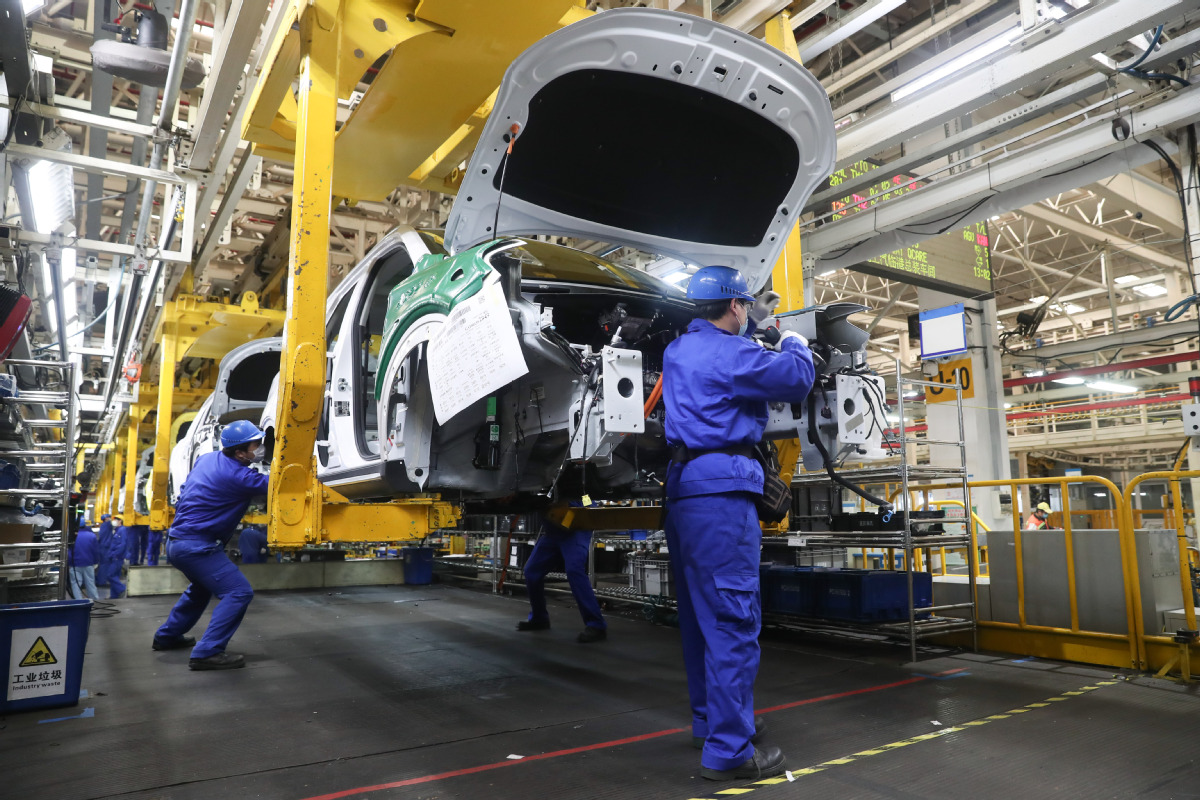Overseas companies hail expanded opening-up

A night scene in Shenzhen, Guangdong province. The country's first special economic zone celebrated its 40th anniversary in October. [Photo/Xinhua]
Enterprises benefit from nation's far-reaching move
One of the most important decisions made by French software company Dassault Systemes last year was to relocate its Asia-Pacific headquarters to Shanghai.
The company said strong performance in China justified moving its regional base to the municipality from Japan.
The Chinese market accounted for many of Dassault Systemes' larger transactions in Asia last year, spanning the transportation, mobility, high-tech, aerospace, marine and offshore sectors.
The company was given access to China to help with construction of Leishenshan Hospital-the emergency facility built in Wuhan, the capital of Hubei province, to respond to COVID-19 in the city.
This access was part of a series of deals the company signed with its Chinese partners, giving full play to its strengths in 3D design and engineering software.
Bernard Charles, CEO of Dassault Systemes, said, "The Chinese government has continued to demonstrate its commitment to further opening-up, which not only promotes the rapid development, transformation and upgrading of China's economy, but also boosts the development potential and offers policy dividends for us."
Buoyed by its strong performance in China and expanded opening-up measures, the company is looking to triple the number of its employees in the country to about 2,000 in the next five to 10 years.
"The determination of the Chinese government to expand opening-up will encourage quality-oriented investment on a larger scale, forming a virtuous cycle of development and driving continued growth. These prospects are greatly appealing to our company," Charles said.
He added that he had been especially encouraged by the commitments made by President Xi Jinping in recent months that China would remain committed to further opening-up and would seek greater synergy through interplay of its domestic and world economies.

A staff member operates a 3D scanner at the third China International Import Expo in Shanghai in November. [Photo by Wang Zhuangfei/China Daily]
Dassault Systemes is just one of many foreign businesses to benefit from ongoing steps taken by China in the past year to open up its economy.
According to the Ministry of Commerce, the country continued to be a hot destination for foreign investment last year, with such inflows growing by 6.3 percent year-on-year to reach 899.38 billion yuan ($129.9 billion) between January and November.
Meanwhile, the country has continued to reiterate its commitment to a level playing field and to create an enabling environment for foreign companies.
The annual tone-setting Central Economic Work Conference last month stressed the importance of promoting all-around opening-up. It also pledged to continue measures to widen market access, promote fair competition and protect intellectual property rights.
Last year, the country reduced the number of items on its negative list for foreign investment from 40 to 33, having cut this list for three consecutive years.
Tommy Wu, lead China economist at think tank Oxford Economics in the United Kingdom, said, "Opening up of the financial sector was substantial in 2020, particularly now that foreign firms are allowed to hold controlling stakes in ventures or branches in China."
He said the industrial and financial sectors in China could benefit from foreign investment, as this is a direct channel to diffuse technology, along with technical and soft skills such as international business practices coming into the country.
"These will generally help China move up the value-added chain, bolstering homegrown technology and innovation, as well as improving global competitiveness of Chinese businesses. It is also in China's interest to embrace multilateralism, to further integrate and be a key player in the global economy," he said.

A worker plays soccer with a robot at the China International Fair for Trade in Services in Beijing in September. [Photo by Zhang Wei/China Daily]
Renewed commitments
President Xi presented his vision for the country's reform and opening-up on a number of occasions last year.
In a speech delivered via video link to the Global Trade in Services Summit at the China International Fair for Trade in Services in September, he said Beijing would remain steadfast in opening up wider to the world and would continue to work on a negative list system for managing cross-border services trade.
"We will further ease market access for the services sector and will take greater initiative to increase imports of quality services," he said.
In Shenzhen, Guangdong province,-the country's first special economic zone that celebrated its 40th anniversary in October-Xi said reform and opening-up must be moved forward at a higher level and new advances must be made on all fronts in such zones.
"Reform will not come to a standstill and opening-up will only go further," he said in a speech in the city on Oct 14.
Xi called for efforts to accelerate opening-up with institutional guarantees such as rules and norms. He also called for a more flexible policy system to be explored and for an enhanced scientific management system in terms of domestic and foreign trade, investment and financing, taxation and finance.
Less than one month later, Xi delivered a speech at a gathering to mark the 30th anniversary of the development and opening-up of Pudong New Area in Shanghai. He urged the area to pioneer the nation's higher level of opening-up and efforts to foster a new development paradigm.
The president reiterated the importance of opening-up as a basic national policy and said there should be no wavering from this at any time.
Any thought about seeking growth behind closed doors, any practice that shuns the outside world, or any act seeking hegemony and bullying would go against the trend of history, he said.
Martin Mueller, chairman of the Swiss Chinese Chamber of Commerce, said he welcomed Xi's policy statement about China's opening-up.
"We appreciate China's commitment to multilateralism and its continued opening-up to more foreign trade and investment. China is now a very big factory for the whole world, and if it maintains this direction, the whole world will benefit," he said.
He added that the chamber welcomes every step taken toward opening-up and leveling the playing field for foreign businesses in China.
"There were important improvements over the past year and we hope this can continue in coming years," he said.
Martin Lockett, dean of Nottingham University Business School China, said, "Both Shenzhen and Pudong exemplify the policy of 'dual circulation'-of simultaneous engagement with the domestic economy and with the world."
In May, China proposed a new development pattern, with domestic circulation as the mainstay and domestic and international circulation reinforcing each other.
Lockett said, "The challenges are how to reproduce the strengths of Shenzhen and Shanghai in other parts of China, and how these two cities can reach world-class levels of innovation comparable with leading regions in countries like the United States and Germany."

Workers assemble vehicles at SAIC Motor in Shanghai. [Photo/Xinhua]
Widened access
On Nov 4, Xi laid out his vision for deepening China's opening-up in a keynote speech delivered via video link at the opening ceremony of the third China International Import Expo in Shanghai.
"We will introduce a negative list for cross-border services trade and open still wider in areas like the digital economy and the internet. We will deepen reform and innovation in trade and investment liberalization and facilitation, and make institutional innovations to support an open economy of higher standards," he said.
The blueprint adopted by the Communist Party of China Central Committee for the 14th Five-Year Plan (2021-25) pledged to implement opening-up policies with greater scope and more depth. Steps to open up the services sector will be taken in an orderly manner and two-way opening-up promoted in the financial sector.
On Dec 23, a report issued by the World Bank highlighted the significance of opening up the Chinese market, particularly the services sector, which "would create more competition and facilitate the exchange of knowledge and technologies".
Mueller said he applauded China's plan to open up its services sector, as foreign companies in this field are eagerly waiting opportunities to further tap the country's market.
"All services companies from Switzerland will be more than happy to explore the market in China, either through the form of joint ventures or on their own," he said.
Lockett also highlighted the significance of a more open services sector to China.
"This sector will be very important to China's development, both in itself and because high-level services enable manufacturing and other sectors to perform better. Opening up services will not only grow this sector, but also improve manufacturing and overall high-quality economic development," he said.

An airplane takes shape at COMAC Shanghai Aircraft Manufacturing Co. [Photo/Xinhua]
Foreign businesses
In a research note, Oxford Economics said it believed China would continue to take measures to open up its economy and financial sector to the outside world this year.
"Building on substantial steps in 2020, we expect more movement on lowering import tariffs and raising or removing foreign ownership caps and capital flow quotas," the note said.
Wu, the researcher, said this would be beneficial in attracting foreign investment to areas other than the financial and auto sectors.
"In particular, opening up the services sector, including insurance, transportation, infrastructure and construction, could yield great benefits to both China and foreign investors," he said.
Wu added that China's manufacturing remains fundamentally competitive in many sectors and its market is still a draw for foreign companies, even though some may move parts of their production processes elsewhere in Asia.
"The sheer size of productive labor and sophisticated local supply chains within China are difficult for others to replace," he said.
"With rising household incomes and the expansion of the middle-income group, foreign companies will continue to find it attractive to stay in China and serve its massive market."


